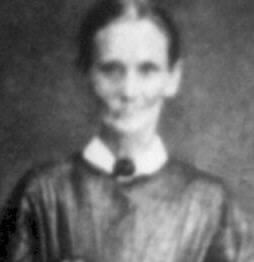John William Sweeney, Jr. and
Sarah Jane Hickok
By W. T. Block
 Sarah Jane Sweeney's paternal grandparents were John William Sweeney, Jr. (b.
Pikesville, MD in 1807-d. Grand Chenier August 17, 1886) and Sarah Jane Hickok (b.
Norfolk, VA May 17, 1817 (some records show 1814)-d. Grand Chenier, LA June 30, 1893).
Sarah Jane Sweeney's paternal grandparents were John William Sweeney, Jr. (b.
Pikesville, MD in 1807-d. Grand Chenier August 17, 1886) and Sarah Jane Hickok (b.
Norfolk, VA May 17, 1817 (some records show 1814)-d. Grand Chenier, LA June 30, 1893).
Her paternal great grandparents were John W. Sweeney, Sr. (b. MD, Ca. 1775-m. January
1, 1801-d. MD, ca. 1810), and his wife Mary Owens (no dates, but said to be foreign-born).
There are so many stories to tell about the Sweeney ancestors that that subject could
take up much space. The principal biographer of John W. Sweeney and Sarah Jane Hickok
during the 1960’s was their great grandson, Chalmer Sweeney of Chevy Chase, Maryland,
son of Dr. Alvin Sweeney, and grandson of Dr. Carter Sweeney. It is known too that Sarah
Jane Hickok was the daughter of John Hickok (ca. 1775-1830) and Hannah Murray (b. October
25, 1792) of Norfolk, VA, the latter having died young, about 1830. Sarah Jane Hickok
married John W. Sweeney on June 14, 1832, at about age 15, in Norfolk, where they
continued to live for a couple years, and their first child Mary Elizabeth (b. August 14,
1833-d. March 5, 1916) was born. From that date, after which she and John moved to
Mississippi, Sarah Jane remained cut off from any of her Hickok siblings until her full
brother, Hugh William Hickok (born Ohio ca. 1820) arrived in Grand Chenier about 1860.
Hugh Hickok, later a Confederate soldier, was killed at the Battle of Fordoche Bayou in
1863, and Mama's brother, Hugh William "Bump" Sweeney was named after him.
John W. and Sarah Jane Hickok Sweeney had left Virginia by 1834, and settled first
at/near Jackson, Hinds Co., Mississippi, where two more children were born, Henry Sidney
(b. February 29, 1836-d. March 13, 1915) and Syrenah Jane, who died in infancy. The
Sweeneys left Mississippi about 1839-1840 by boat, bound for Texas, when they took refuge
from a storm in the Mermentau River. They thus became about the third white couple to
settle in Grand Chenier, where Sarah traded a gold watch to the Apelusa Indians for the
farmland on which they raised cotton. They had about 11 or 12 children altogether, the
oldest daughter, Mary Elizabeth (Aunt Lizzie Bonsall, Vaughn), and oldest son, Henry
Sweeney, having been born previous to their arrival. First, it is difficult to understand
why they left Mississippi, because more than one million acres of former Choctaw lands had
just been opened for settlement. Certainly Central and Eastern Louisiana were entirely
settled by Acadian French people before 1830, and if a couple wished to move to Texas, a
trip by boat was almost necessary. Friends of the Sweeneys named Dr. Milledge McCall had
already moved from Mississippi and resettled at Grand Chenier ahead of them. I always have
said that both the Sweeneys and Smiths had to "leap-frog over the French" in
order to find a place to settle and raise cotton.
The other Sweeney children included Harriet Ann (McCall, Weatherill, born June 14,
1841-d. 1884); John W. Sweeney III (the first sheriff of Cameron Parish, b. March, 1846-d.
Sugarland, TX, 1931); Sarah Ellen, who married Jules Bouquet and moved to Texas (b.
1844-d. 1889); James Hill Sweeney, my grandfather (b. September 25, 1849-d. October 7,
1891); Dr. George Carter Sweeney, (b. October 6, 1851-d. November 1922); Andrew T.
Sweeney, (b. August 18, 1856-drowned October 1881); Rev. Frank Newton Sweeney, (b. May 5,
1859-d. December 19, 1936), also a Methodist minister; and Virginia (Aunt Jennie Logan of
Port Arthur, b. February 25, 1854-d. March 8, 1936). There were probably two or three
others, who perhaps died stillborn or infants and names that did not survive. Aunt
Lizzie's oldest son, Dr. Isaac Bonsall, Jr. was also born about 1853, and for thirty
years, he and Dr. Carter Sweeney were the only physicians at either Grand Chenier or
Leesburg (now Cameron). Aunt Lizzie Bonsall and Aunt Harriet McCall were each widowed
one-day apart. Harriet's husband, Confederate Lt. Wm. McCall, died of pneumonia at
Mansfield, LA, on April 7, 1864 (another account said he was killed by Jayhawkers). The
next day, Aunt Lizzie's husband, Confederate Pvt. Isaac Bonsall Sr., was killed at the
Battle of Mansfield or Sabine Crossroads, LA, the greatest Confederate victory in the
west, but it was a costly one for the Sweeneys.
One story often told about John W. Sweeney, Jr., concerned the amputation of his arm
‘Grand Chenier-style,’ which was mangled in a cotton gin and was cut off by
Harriet’s brother-in-law, who had been a surgeon’s assistant at the Siege of
Vicksburg. Sweeney was ‘plastered,’ soaked in whiskey in order to kill as much
pain as possible, and then the ‘surgeon’ used a razor, hacksaw, a needle and
thread to remove the mangled forearm. That was done about 1870, and Sweeney lived on 16
years until 1886.
Another tragedy of that period was the drowning of Andrew T. Sweeney in the Gulf of
Mexico in the fall of 1881. Andrew Sweeney was engaged to be married to Margaret Doland
when he loaded about 15 bales of his cotton aboard the schooner Two Sisters, bound for
Galveston. There he had planned to buy his wedding suit, some pots and dishes, and his
furniture before he returned to marry his fiancee. Somewhere near Galveston at night, it
was discovered that the hold of the schooner was filling with water. Each of the five men
aboard went into the water, hanging onto a cotton bale and hoping to drift ashore. One man
reached shore alive; the bodies of two others washed up on the beach; but the body of
Andrew Sweeney was never found.

